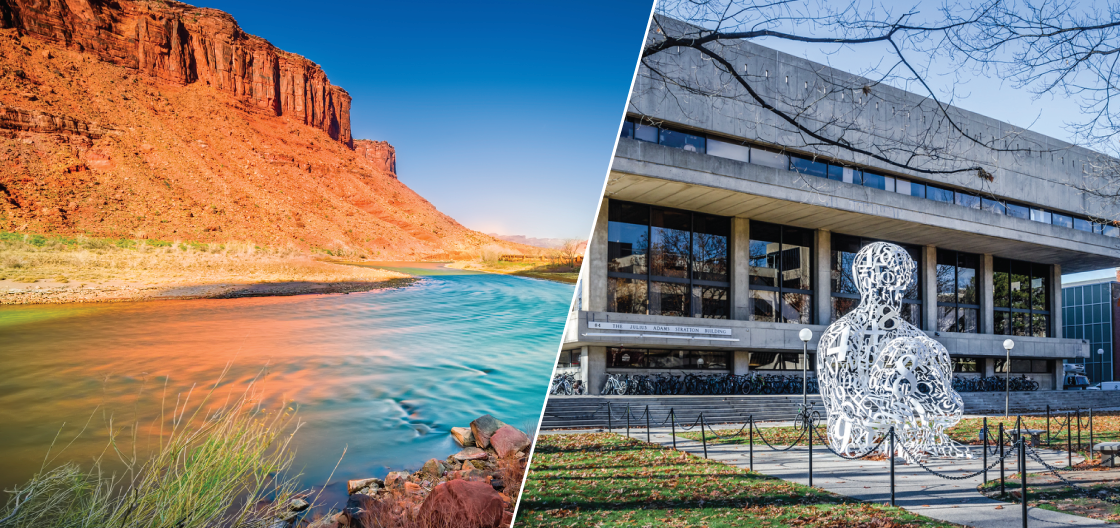New Brock Experiences explore social issues
Published 12:39 pm Tuesday, November 7, 2017

- Two new Brock Experiences will take Longwood students to Boston and the Colorado River to study how the arts shape a community and who has valuable access to water.
In two years, a group of Longwood students will breathe in the crisp mountain air near the headwaters of the Colorado River, the fifth-longest river in the U.S. and the most important source of water in the region. Then the group will set off on a multiweek intensive learning experience following the river southwest through Arizona. Along the way they’ll meet with farmers, businessmen, residents and biologists — stakeholders with often competing ideas about to whom the water belongs and how it should be used.
“Meanwhile, another cadre of Longwood students will head north to one of the country’s most culturally rich cities, Boston,” officials said in a press release. “In a city with world-class art museums and performing arts venues, as well as historical monuments and museums, they’ll explore how the arts shape a community — and dive deeply into the complex civic debate over how best to fund them.”
According to the release, these two new Brock Experiences — the latest in a growing series of immersive, citizenship-focused courses at sites around the United States — were recently announced.
“Selected for the prestigious two-year faculty fellowships to develop the courses are Michael Mergen, associate professor of photography, who will develop the Colorado River course, and Dr. Shawn Smith, associate professor of English, who will develop the Boston course,” officials said in the release. “These kinds of courses can’t be found at any other college or university in the United States.”
Dr. Ken Perkins, director of development for academic priorities and provost emeritus
“These kinds of courses can’t be found at any other college or university in the United States,” said Dr. Ken Perkins, director of development for academic priorities and provost emeritus, who serves on the Brock Experience selection committee. “Through the generous gift from Joan ’64 and Macon Brock, we have built now a solid foundation of courses that will not only be an unforgettable experience for generations of Longwood students, but an important part of shaping new citizen-leaders who look at unresolved issues in their own communities from different perspectives and strive to solve them.”
In 2016, the largest gift in Longwood’s history — $5.9 million from the Brocks — created an incubator for faculty to develop U.S.-based courses that study the important issues of our time. Courses in place or being developed include Yellowstone National Park to study resource management, Chesapeake Bay to study sustainability, Arizona and Richmond to study immigration, and the Arctic Circle to study pipelines. New courses are selected each fall for a two-year development-and-trial period, after which the course joins other fully developed courses as options for Longwood students.
Brock Experiences are modeled after the highly successful and popular Yellowstone National Park course, where students have studied natural resource management for the last decade. Courses typically take place during the summer and involve travel to a place in the country to learn firsthand about an unresolved issue from a variety of perspectives.
For instance, Smith wrote in his application that students studying in the Boston course will grapple with difficult questions including, “If the arts and culture—including historical sites and a recognition of the humanities—are important social endeavors worth funding, where is such funding to be found? If governments are reluctant to fund the arts, what are the means by which citizens can organize to encourage such funding? And if such funding is made available, how can it be used to achieve the greatest social good?”
In 2016, Mergen co-taught “On The Campaign Trail,” an interdisciplinary course in which students followed presidential campaigns around the East Coast in the run-up to Longwood’s hosting the Vice Presidential Debate. He has also led a study abroad course in India. In the new Brock Course, he will oversee the creation of a multidisciplinary course that will show students firsthand one of the nation’s most important rivers and push them to think thoroughly and carefully about the key question, “Whose water is it?”
Through experiences, “students will not only have a better sense of their country but also a better sense of themselves,” Mergen wrote. And by better understanding the competing demands for uses of water ranging from irrigation to power generation, they will confront both local and national issues “students can consider when they return to school and to their home communities.”
“The proposals we received this cycle revealed a deep interest from Longwood faculty in exploring citizenship through interdisciplinary study of the issues of our day,” said Josh Blakely, director of Brock Experiences. “Narrowing the field to two was a lengthy process — testament to the thought professors put into their proposals and the strength of their ideas. With now six strong, diverse courses to eventually choose from, we can be confident that generations of Longwood students will find lifelong benefit from these studies. As that list grows with more courses like Yellowstone, Boston and the Colorado River, these courses will undoubtedly become one of the highlights of a Longwood education for years to come.”





